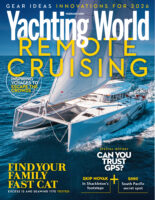Talk of a postponement of the Transat Jacques Vabre has reopened a debate about sending multihulls out into Biscay weather in November. Skipper Giovanni Soldini has firm views, reports Elaine Bunting
Organisers of the two-handed Transat Jacques Vabre from Le Havre to Salvador, Brazil, are considering whether to postpone the start for multihulls on Sunday, in view of a forecast of headwinds of 30-30 knots ahead of a deep low of 960mb (see left). Race director Gérard Petipas has intimated that he will start the monohulls as planned on Saturday in more moderate winds, but may delay the multihull start scheduled for the following day.
Petipas treads a fine line. He is said to be reluctant to postpone the start, thus setting a precedent that suggests the ORMA 60 trimarans are not fit for their purpose. At the same time, he is sharply mindful of the disastrous Route du Rhum last year, when the biggest, newest and most expensive fleet in the class’s history was decimated by a Biscay storm which caused five capsizes and seven retirements as a result of structural damage. Loïck Peyron’s Fujifilm was pummelled to flotsam and a major portion of the fleet was put out of action for months.
A possible delay has re-opened a debate about the development of ever more powerful, but also more friable trimarans, as well as about the rigid scheduling of the single-handed and double-handed transatlantic races in November, when the odds of seeing Biscay at its meanest are inescapably high.
Some argue that since these races are a fundamental, indeed a weighted, part of their programme, the trimarans should be designed and built for the conditions they could face; others that a late autumn start tempts fate and is an easy hazard to eliminate. The second camp point out that it took fatalities before the Mini Transat was shunted back to October, and that the organisers of the transatlantic races should act before it happens here.
One skipper who feels particularly strongly is Giovanni Soldini, who transferred several years ago from the Open 60 monohull fleet to a new ORMA 60 trimaran, now called TIM. “We work all year like dogs, thousands and thousands of hours and we don’t want to destroy the boats,” he says. “The Route du Rhum and the Transat Jacques Vabre should start in October, a month earlier.”
Soldini does not believe that the multihulls can be made safe for the worst that Biscay can dish out in November. He cites last year’s Route du Rhum, when Méteo France forecast 50 knots but the multis got scourged by 70 knots. “Multis are built for medium conditions, they are not for heavy weather. The proof is that no-one is sailing them in the Southern Ocean,” he says.
“In the monos, we worked very hard to increase the safety, but with multis you cannot do this; it’s just the type of boat. You could build a steel trimaran and still you could end up broken in three pieces because each wave you take three times.”
Commenting on the risk of meeting a tropical storm if the start were earlier, he says: “It’s not a problem because we can do 30 knots and we can sail all around it. But here we are close to land and if there is a storm we are f***ed!”
But Soldini is cynical about the motives of organisers and sponsors alike for sticking to a November start. “There is more press and publicity if there are disasters,” he says. “Look at last year. The press files after a bad race are huge. Two or three years after, no-one cares why there [was] three hours of television.”
He believes skippers themselves have no real power to lobby for a change because French sponsors tend to drive their own sailing programmes. In some cases the skippers are effectively jockeys. “Look at the skipper of Banque Covefi [Bertrand de Broc]. He gave up last year and said it was too dangerous and this year they have replaced him with a new skipper,” says Soldini.
However strongly they may feel, if the organisers decide to go ahead with a start this weekend, Soldini and the other 14 ORMA 60 skippers will leave Le Havre, come what may. “If they start on Sunday, I will take the start. I have no choice,” says Soldini. “But why destroy all this work, this fleet, and millions of Euros?”



